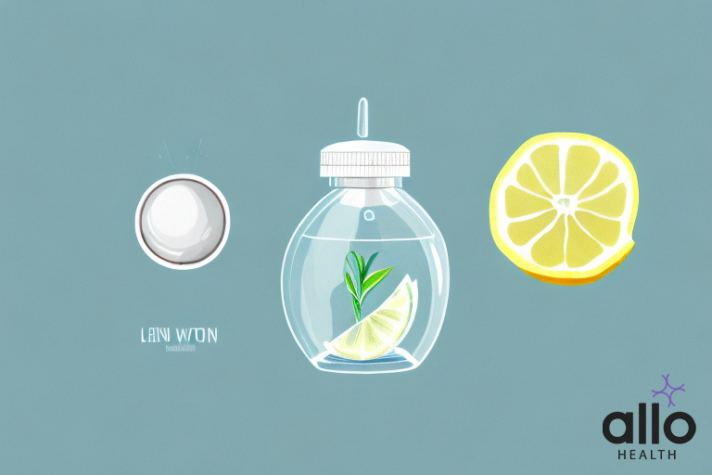Lemon Water During Periods: Benefits, Precautions, and Debunking Myths

Allo Health is dedicated to personalized well-being, offering support and trusted information tailored to individual health goals. The platform emphasizes human-generated content, led by a distinguished medical team of experts, including physicians and sexual health specialists. Their commitment to credibility involves rigorous fact-checking, authoritative research, and continuous updates to ensure accurate, up-to-date information. Allo Health's unique approach goes beyond conventional platforms, providing expert-led insights and a continuous commitment to excellence, with user feedback playing a crucial role in shaping the platform's authoritative voice.

Dr. Aswathi P T earned her MBBS degree and completed her internship at Government Medical College, Kozhikode, and possess diverse professional background spanning 3.5 years. Her experience includes a wide range of healthcare settings, including health centers, hospitals, and teleconsultation services.
Why This Was Upated?
Our experts continually monitor the health and wellness space, and we update our articles when new information became available.
Updated on 12 April, 2024
- Article was updated as part of our commitment to diversity, equity, and inclusion.

"The following blog article discusses food and diet-related information for general educational purposes. However, it is important to note that the information provided is not intended as personalized dietary advice and should not be considered a substitute for professional guidance from a registered dietitian or qualified healthcare professional. Before making any significant changes to your diet or nutrition plan, it is recommended to consult with a registered dietitian or healthcare professional.
Book consultation
Dietary changes can have a significant impact on your overall health and well-being. It is important to approach any changes to your diet in a balanced and sustainable manner, ensuring that you meet your nutritional needs and avoid any potential nutrient deficiencies. Rapid or extreme changes in dietary patterns can be detrimental to your health and may require professional guidance.
It is crucial to note that any specific dietary recommendations or guidelines mentioned in this article may not be appropriate for individuals with specific medical conditions, allergies, or intolerances. A registered dietitian or healthcare professional can provide individualized advice, including modifications or alternative food choices to accommodate your unique circumstances.
The information provided in this article may not encompass all possible dietary considerations or account for the latest research and nutritional guidelines."
For most women out there, what to eat and drink during menstruation is a stubborn dilemma often met with curiosity and concern. One particular question that is asked by many females is- “Can we drink lemon water during periods?”
Lemon water, a mixture of lemon juice and water, is believed to offer numerous health benefits. In this article, we will explore whether drinking lemon water during periods is safe, beneficial, and what considerations one should keep in mind.
The Health Benefits of Lemon Water For a Holistic Health

While its refreshing taste is undoubtedly appealing, lemon water is also known for its potential to promote holistic health. From aiding digestion to supporting immunity, the benefits of this natural beverage are numerous and can contribute to an overall sense of well-being.
Here is a look out of an overall holistic health approach with lemon water-
Hydration
Staying properly hydrated is fundamental to maintaining holistic health. Lemon water can make the process of hydration more enjoyable, encouraging individuals to consume more water throughout the day. Additionally, the citric acid in lemon may stimulate the liver to produce enzymes that help flush out toxins, promoting a cleaner internal environment.
Digestive Health
Lemon water’s acidic nature can aid in digestion by stimulating the production of stomach acids and bile. This can enhance the breakdown of food and facilitate nutrient absorption. Drinking lemon water before or during meals may reduce bloating and indigestion, promoting a more comfortable digestive experience.
Vitamin C Boost
Lemons are renowned for their high vitamin C content, a potent antioxidant that supports the immune system. Regular consumption of lemon water can help bolster your body’s defense mechanisms, making it more resilient to infections and illnesses. Vitamin C is also essential for collagen synthesis, promoting healthy skin, joints, and connective tissues.
Alkalizing Effect
Despite their acidic taste, lemons have an alkalizing effect on the body once metabolized. An alkaline environment is believed to be beneficial for holistic health, as it may counteract the acidity associated with certain health issues. Maintaining a balanced pH level can support overall vitality and reduce the risk of chronic diseases.
Weight Management
Lemon water is often touted as a weight loss aid. While it’s not a miracle solution, incorporating it into a healthy diet and lifestyle can provide some benefits. The pectin fiber in lemons may help control cravings and suppress appetite, making it easier to make mindful eating choices.
Skin Health
The antioxidants in lemon water, including vitamin C, play a crucial role in maintaining skin health. These antioxidants combat free radicals that contribute to premature aging and skin damage. Drinking lemon water may help promote a youthful complexion and contribute to an overall radiant appearance.
Mood Enhancement
The aroma of lemon is known for its uplifting and invigorating properties. Aromatherapy practices often use lemon scents to improve mood and reduce stress. Starting your day with a glass of warm lemon water can set a positive tone and provide a gentle energy boost.
Lemon Water And Menstruation: Is There a Connection?
Menstruation is a natural bodily process that occurs in individuals with a uterus. It involves the shedding of the uterine lining, which is accompanied by hormonal fluctuations. These fluctuations can lead to various symptoms such as cramps, bloating, mood changes, and fatigue. The menstrual cycle typically lasts about 28 days, but it can vary from person to person.
Lemon water is a refreshing beverage that can contribute to hydration, vitamin intake, and potential digestive support during menstruation. Although, lemon water does not directly affect the menstrual cycle’s timing, flow, or symptoms, it indirectly contributes to the overall health of women during periods and thus pose effective benefits.
The Benefits of Drinking Lemon Water During Menstruation
Potential benefits of lemon water that can support women’s well-being during periods include-
- Proper hydration
- Energy and Immunity Boost
- Relieving digestive issues
- Enhancing relaxation
- Detoxification
- Hormonal and electrolyte balance
- Relief from cramps
- Constipation relief
- Stress Reduction
Let us go through these benefits in detail.
Hydration Enhancement
Staying hydrated is essential during menstruation to counteract fluid loss and prevent dehydration. Lemon water provides an enticing way to increase fluid intake. Its refreshing taste might encourage individuals to drink more water than they would with plain water alone. Proper hydration can help manage bloating and maintain overall bodily functions.
Immune System Boost
Lemons are a potent source of vitamin C, an antioxidant that plays a crucial role in supporting the immune system. During menstruation, hormonal changes can temporarily weaken the immune response, making the body more susceptible to infections. Drinking lemon water can provide a vitamin C boost, helping the immune system fend off potential illnesses.
Alleviation of Digestive Discomfort
Some women experience digestive discomfort during their periods, including bloating and indigestion. Lemon water’s natural acidity might aid digestion for certain individuals. It can stimulate the production of digestive enzymes and promote better absorption of nutrients, potentially reducing bloating and discomfort.
Mood Enhancement
Menstruation can also bring about mood swings and emotional changes due to hormonal fluctuations. The aroma of lemons is known for its uplifting properties, which can contribute to improving mood and reducing stress. Starting the day with a glass of warm lemon water might provide a positive and invigorating start to the morning.
Alkalizing Effect
Despite its acidic taste, lemons have an alkalizing effect on the body when metabolized. An alkaline environment can help counteract the increased acidity that sometimes accompanies hormonal fluctuations. Maintaining a balanced pH level can promote overall well-being and reduce the risk of chronic diseases.
Cramp Relief
Lemon water’s potential to alleviate cramps is attributed to its vitamin C content. Vitamin C plays a role in reducing muscle soreness and inflammation. Drinking lemon water may contribute to reducing the severity of menstrual cramps, helping you feel more comfortable during this time.
Stress Reduction
Menstruation can bring about emotional stress due to hormonal fluctuations. Lemon’s invigorating aroma is known for its stress-reducing properties. Starting your day with a glass of lemon water might provide a gentle mood boost and help you face the day with a positive mindset.
Blood Circulation
Lemon water’s vitamin C content can also contribute to improved blood circulation. Healthy circulation is essential during menstruation to ensure that oxygen and nutrients are delivered to tissues and organs. Proper circulation can help reduce feelings of coldness and improve overall energy levels.
Constipation Relief
Some women experience changes in bowel movements during their periods, which can lead to constipation. Lemon water’s acidity might promote better digestion and encourage regular bowel movements, providing relief from constipation.
Lemon Water as a Natural Remedy for Menstrual Pain
Menstrual pain, also known as dysmenorrhea, ( categorized into primary dysmenorrhea and secondary dysmenorrhea) can bring about discomfort and disruption during a woman’s menstrual period. While it’s common to resort to pain relievers, there are natural alternatives worth considering like lemon water.
- Lemon water, consisting of warm water infused with a shot of lemon juice, offers both hydration and potential relief from menstrual cramps. The warm water content can help relax the uterine muscles, potentially easing cramps and minimizing pain.
- Lemon juice is rich in antioxidants and anti-inflammatory compounds, making it a potential natural pain reliever. These properties could aid in reducing inflammation and alleviating the discomfort associated with menstrual cramps.
- Lemon juice contains vitamin C, which possesses antioxidant properties. Antioxidants help neutralize free radicals, which can contribute to inflammation and pain.
- Some women experience bloating and discomfort due to water retention during menstruation. Lemon water’s hydrating properties can contribute to a reduction in bloating and feelings of discomfort.
- Incorporating lemon juice can stimulate digestion and alleviate gastrointestinal symptoms that occasionally accompany menstrual periods. Moreover, the refreshing aroma of lemon water might contribute to mood enhancement, potentially counteracting mood swings or irritability linked to hormonal fluctuations.
- Some studies suggest that vitamin C can enhance nutrient absorption and maintain blood vessels’ integrity, potentially leading to a light flow during periods.
Is Lemon Water Safe to Drink While on Your Period?
Yes, lemon water is generally safe to drink during your period and may even offer some potential benefits.
- Staying well-hydrated is essential during menstruation to maintain proper bodily functions and potentially alleviate discomfort. Lemon water provides a refreshing and flavorful way to increase fluid intake.
- The acidity of lemon juice might raise concerns about its effects on digestion, particularly during periods when some women experience digestive changes. However, the acidity of lemon juice becomes more diluted when mixed with water, making it generally safe for consumption. In fact, this mild acidity can aid digestion for some individuals, potentially helping with bloating and discomfort.
- Lemon juice boasts antioxidants and anti-inflammatory compounds that may hold promise for alleviating period pain. This is particularly beneficial for those looking for alternatives to conventional pain medications.
- The presence of vitamin C in lemon juice can provide a valuable nutrient boost, supporting overall health and potentially bolstering the immune system during menstruation. This added nutrition can contribute to improved well-being during this time of the month.
- Hydration combined with the potential diuretic effect of lemon juice in warm water can promote gentle detoxification. This process aids in eliminating excess water and potentially reducing feelings of bloating and discomfort associated with the menstrual period.
- While lemon water is generally safe, individuals with sensitive stomachs may want to exercise caution. The acidity of lemon juice can vary in its impact on different people, potentially causing discomfort in some cases. If you have a history of acid reflux or sensitive digestion, it’s recommended to monitor your body’s response and make adjustments accordingly.
The Best Time to Drink Lemon Water During Your Menstrual Cycle
The menstrual cycle is a natural physiological process that brings about a range of physical and emotional changes in a woman’s body. There an optimal time to drink lemon water during the menstrual cycle. Let’s explore the timing considerations and benefits of incorporating lemon water into your menstrual self-care routine.
Menstrual Flow Phase (Days 1-5)
During the initial days of menstruation, when the flow is typically heaviest, staying hydrated is crucial to replenish the fluids lost. Drinking lemon juice can provide a dual advantage. The hydration from the water helps counteract fluid loss, while the vitamin C content in lemon juice supports the immune system, which might be slightly compromised during menstruation.
Follicular Phase (Days 6-14):
The follicular phase follows menstruation and is characterized by the development of follicles in the ovaries. This is generally considered a good time to continue consuming lemon water. The antioxidants in lemon juice, along with its hydrating properties, can contribute to maintaining a healthy balance and supporting your overall well-being.
Ovulation Phase (Around Day 14):
As ovulation approaches, hormone levels peak, and some women may experience heightened sensitivity or bloating. Drinking lemon juice during this phase can help mitigate bloating due to its gentle detoxifying properties. Additionally, the hydrating effect of lemon water aids in maintaining proper bodily functions.
Luteal Phase (Days 15-28):
The luteal phase is characterized by hormonal fluctuations and is often associated with premenstrual symptoms such as mood swings and cramps. Lemon juice can be beneficial during this phase as well. The anti-inflammatory properties of lemon juice may help alleviate cramps and discomfort, while the hydration can contribute to an overall sense of well-being.
While there isn’t a strict rule on the best time to drink lemon water during your menstrual cycle, listening to your body’s signals is key. Pay attention to how you feel and adjust your consumption based on your comfort level.
Some women find that starting their day with a glass of warm lemon water helps kickstart their metabolism and provide a refreshing start. Others may prefer to have it throughout the day to maintain hydration and reap the potential benefits of lemon juice.
Things To Keep in Mind Before Having Lemon Water in Periods
While lemon water can offer potential benefits, there are several important factors to keep in mind before incorporating it into your period routine in order to avoid consequential symptoms that can be harmful. Here are some key considerations to take into account:
Acidity and Sensitivity
Lemon juice is acidic, and while its acidity is diluted when mixed with water, some individuals may still be sensitive to its effects. If you have a history of acid reflux, sensitive digestion, or a tendency to experience stomach discomfort, it’s advisable to proceed with caution. Pay attention to how your body reacts and consider reducing the concentration of lemon juice or avoiding it if you experience any discomfort.
Individual Tolerance
Each woman’s body responds differently to dietary changes during menstruation. What works well for one person may not be suitable for another. Before incorporating lemon juice into your period routine, consider your individual tolerance level. If you’re unsure, start with a small amount of lemon juice in water and gradually increase it as you gauge your body’s response.
Medications and Health Conditions
If you’re taking any medications or have pre-existing health conditions, it’s a good idea to consult with your healthcare provider before making significant dietary changes. Lemon juice, like any other food or beverage, can interact with certain medications or conditions, so seeking professional guidance ensures your safety and well-being.
Hydration Balance
While lemon water can contribute to hydration, excessive consumption of acidic beverages might potentially disrupt the body’s pH balance. Balance is key; make sure you’re also drinking plain water to maintain proper hydration levels during your period.
Stomach Comfort and Digestion
Some women experience changes in digestion and stomach comfort during their periods. While lemon juice’s mild acidity can aid digestion for some, others might find it exacerbates digestive discomfort. It’s important to gauge how your stomach responds to lemon juice and decide whether it enhances or hampers your digestive well-being.
Pain Relief Expectations
Lemon juice is believed to have anti-inflammatory properties that might offer relief from period pain. While some individuals may experience pain relief, others may not notice a significant difference. Keep in mind that lemon juice isn’t a replacement for medical treatment if you experience severe cramps or pain during your period.
Moderation and Balance
While lemon juice has potential benefits, moderation and balance are key. Consuming excessive amounts of lemon juice may lead to an overload of acidity or upset stomach. Aim for a balanced approach and consider incorporating other hydrating and nutrient-rich foods into your diet as well.
Personal Preferences
Lastly, remember that personal preferences play a role. If you enjoy the taste of lemon water and find it soothing or refreshing during your period, that’s a valid reason to include it in your routine. If you’re unsure, it’s always a good idea to consult with a healthcare professional before making any significant dietary changes.
Debunking Myths About Having Lemon Water During Periods
The menstrual period is a time of heightened sensitivity and physical changes, often accompanied by various myths and misconceptions about what’s safe and beneficial. Similar is the case with misconceptions related to lemon juice during menstruation. Let’s delve into some common myths surrounding this topic and separate fact from fiction.
Myth 1: Lemon water will make your period heavier.
One prevalent myth is that consuming lemon water during your period can make the flow heavier. However, there is no scientific evidence to support this claim. Menstrual flow is determined by hormonal fluctuations and uterine shedding, not by the consumption of lemon water or any other beverages.
Myth 2: Lemon water causes cramps.
Some believe that the acidity of lemon juice can worsen menstrual cramps. While excessive consumption of acidic foods might trigger discomfort in some individuals with sensitive stomachs, the diluted acidity of lemon water is unlikely to directly cause or worsen cramps. In fact, the anti-inflammatory properties of lemon juice might actually help alleviate cramps for some women.
Myth 3: Lemon water delays menstrual cycle.
There is no scientific basis to the claim that drinking lemon water can delay your menstrual cycle. The timing of your period is primarily governed by hormonal interactions and the menstrual cycle phases. Lemon water, like any other beverage, is unlikely to influence this complex process.
Myth 4: Lemon water interferes with birth control pills.
Another misconception is that lemon water can interfere with the effectiveness of birth control pills. Birth control pills work by regulating hormones to prevent ovulation. Lemon juice is not known to have any impact on the hormonal mechanisms of birth control pills.
Myth 5: Lemon water causes imbalance in body pH.
Some worry that the acidity of lemon juice can disrupt the body’s pH balance. While lemon juice itself is acidic, it becomes more alkaline-forming once metabolized in the body. Moreover, the small amount of lemon juice in a glass of water is unlikely to significantly impact the body’s overall pH balance.
Myth 6: Lemon water aggravates digestive issues.
Concerns exist that lemon water might worsen digestive issues, such as acid reflux or bloating. For individuals with sensitive stomachs, excessive consumption of acidic foods could potentially trigger discomfort. However, diluted lemon juice in water is generally well-tolerated by most people and might even aid digestion for some.
Myth 7: Lemon water causes retention.
Contrary to the myth that lemon water causes water retention, the opposite may be true. Lemon water’s diuretic effect can actually contribute to gentle detoxification and the elimination of excess fluids, which might help alleviate bloating and discomfort during your period.
Incorporating Lemon Juice in Your Daily Diet
Lemons are not just a zesty addition to your culinary repertoire; they also offer a multitude of health benefits. Incorporating lemon juice into your daily diet can be a refreshing and flavorful way to enhance your overall well-being. From boosting hydration to providing a dose of vitamin C, here are some creative and practical ways to make lemon juice a regular part of your daily routine.
Start your day with lemon water
Begin your morning by kickstarting your metabolism and hydration levels with a glass of warm lemon water. Squeeze the juice of half a lemon into a glass of lukewarm water. This simple ritual can aid digestion, provide a vitamin C boost, and set a positive tone for the day.
Whip up a citrus dressing
Elevate your salads by creating a homemade citrus dressing. Mix freshly squeezed lemon juice with olive oil, a dash of honey, Dijon mustard, and a sprinkle of herbs. Drizzle this flavorful dressing over your greens for a tangy twist.
Lemon-infused beverages
Experiment with lemon-infused beverages beyond traditional lemonade. Add lemon slices to your water, sparkling water, or herbal tea for a hint of citrusy goodness without the need for added sugars.
Lemon-Marinated proteins
Use lemon juice as a natural marinade for proteins like chicken, fish, or tofu. The acidity of lemon juice not only imparts flavor but also helps tenderize the protein.
Zest up your cooking
Don’t let the zest of lemons go to waste. Grate the lemon zest into dishes like pasta, risotto, or roasted vegetables to infuse a burst of citrus aroma and flavor.
Lemon-Flavored smoothies
Elevate your morning smoothie by adding a shot of lemon juice. Blend it with your favorite fruits and leafy greens for a zesty and nutritious concoction.
Lemon zest snacks
Sprinkle lemon zest over yogurt, oatmeal, or granola for an instant flavor boost. The zest imparts a concentrated citrus flavor that can elevate your snack game.
Lemon-Roasted vegetables
Toss your favorite vegetables with lemon juice, olive oil, and your choice of herbs before roasting. The lemon juice caramelizes during cooking, enhancing the vegetables’ natural flavors.
Lemon dessert delights
Lemon juice is a staple ingredient in various desserts. From lemon bars to lemon sorbet, you can create delectable sweet treats that balance sweetness with tanginess.
Lemon-Accented rice and grains
Add depth to your rice or quinoa by mixing in a bit of lemon juice. This technique infuses a subtle citrus note that complements a variety of dishes.
Lemon-Flavored baking
Lemon zest and juice can elevate baked goods, from muffins to cakes. Incorporate them into your recipes for a delightful citrus twist.
While lemon juice offers contains ample nutrients and have numerous health benefits, moderation is key. The acidity can affect tooth enamel if consumed excessively, so be mindful of your intake. Additionally, if you have any underlying health conditions, it’s a good idea to consult a healthcare professional before making significant dietary changes.
Incorporating lemon juice into your daily diet can be a flavorful journey to better health. Whether you’re looking to boost your hydration, enhance your meals, or infuse dishes with a burst of tanginess, the versatile lemon has you covered. So, grab those lemons and get creative in the kitchen while reaping the benefits of this citrus gem.
Frequently Asked Questions
Q: Can I drink lemon water during my period?
A: Yes, you can drink lemon water during your period. Lemon water can offer hydration, a boost of vitamin C, and potential anti-inflammatory properties. However, individual responses vary, so pay attention to how your body reacts and adjust accordingly.
Q: Will lemon water make my period heavier?
A: No, lemon water does not affect the heaviness of your period or will cause heavy bleeding. Menstrual flow is determined by hormonal factors, not by the consumption of specific foods or beverages.
Q: Can lemon water delay my menstrual cycle?
A: No, lemon water does not have the ability to delay your menstrual cycle. The timing of your period is determined by hormonal interactions and the natural menstrual cycle phases.
Q: Is lemon water safe while using birth control pills?
A: Lemon water is generally safe to consume while using birth control pills. Lemon water’s acidity is unlikely to interfere with the effectiveness of hormonal birth control methods.
Q: Can lemon water replace medical treatments for period symptoms?
A: Lemon water can provide hydration and potential benefits, but it is not a replacement for medical treatment. If you experience severe period symptoms, consult a health care provider for appropriate guidance.






































